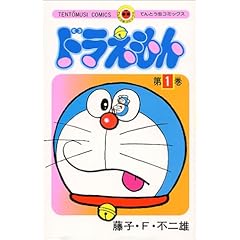
 Hello Kitty, then Pokémon (Poketto Monsutā) as a Nintendo game, later a movie and TV series, swept the island nation of Japan. The allure and lasting popularity of theses comic and cartoon characters spawned official recognition from Japan that a comic ambassador of their ilk was urgently required on the diplomatic cultural front.
Hello Kitty, then Pokémon (Poketto Monsutā) as a Nintendo game, later a movie and TV series, swept the island nation of Japan. The allure and lasting popularity of theses comic and cartoon characters spawned official recognition from Japan that a comic ambassador of their ilk was urgently required on the diplomatic cultural front.Enter the doryaki (red bean pastry) eating cat Doraemon (b. 1969) to take on the awesome responsibility of making lifelong animé pals worldwide for Japan. The Land of the
 Rising Sun takes their cartoon cats very seriously, indeed. Hello Kitty is pretty tough to beat in Japan and other Asian markets for branding, but A-list celeb Doraemon is another type of cartoon cat, a giant teal blue one this time, that has special characteristics with wonder gizmos in a stomach pouch and competencies enabling purring pontifications about Japanese animé. Doraemon brooks no competition from American cartoon staples. Doraemon is beating some sixty year old mouse from Disney and a pudgy bear cub with a honey fetish who has a cute ass as a friend with optimism issues for popularity. Duh, from a ten year old Bart can't even beat Doraemon.
Rising Sun takes their cartoon cats very seriously, indeed. Hello Kitty is pretty tough to beat in Japan and other Asian markets for branding, but A-list celeb Doraemon is another type of cartoon cat, a giant teal blue one this time, that has special characteristics with wonder gizmos in a stomach pouch and competencies enabling purring pontifications about Japanese animé. Doraemon brooks no competition from American cartoon staples. Doraemon is beating some sixty year old mouse from Disney and a pudgy bear cub with a honey fetish who has a cute ass as a friend with optimism issues for popularity. Duh, from a ten year old Bart can't even beat Doraemon. Using the political lexicon of the esteemed Joseph Nye of Harvard, Doraemon is using "soft power" to gain trust currency with audiences rather than "hard power" or trade imbalances caused by the sinking US dollar or the tremendous amount of Japanese manufactured goods coming onto the rest of the world's shelves and showrooms. Japan is making a strategic shrewd move and using a comic cat to ensure they touch each generation of consumers of manga or animé. It is a huge market opportunity and comic book readers, gamers and other students of the art form the world over are growing in economic power. Japan is branding themselves as the anime leader to reach out, not in an ordinary flesh and blood boring human way, which would just ruin the relationship effect and the drama of the art form.
Using the political lexicon of the esteemed Joseph Nye of Harvard, Doraemon is using "soft power" to gain trust currency with audiences rather than "hard power" or trade imbalances caused by the sinking US dollar or the tremendous amount of Japanese manufactured goods coming onto the rest of the world's shelves and showrooms. Japan is making a strategic shrewd move and using a comic cat to ensure they touch each generation of consumers of manga or animé. It is a huge market opportunity and comic book readers, gamers and other students of the art form the world over are growing in economic power. Japan is branding themselves as the anime leader to reach out, not in an ordinary flesh and blood boring human way, which would just ruin the relationship effect and the drama of the art form.Anime has elements to the final product. It is usually hand drawn with some help from computer programs these days. Giant robots are a popular genre. Manga essentially translates into comics and has a pre-post World War II influence seriously studied. Many popular manga artistes were born in 1949 having a different perspective than some of the other comic artists of today. There are some gender differences in the art form. In 2007, manga or comics drew in almost 407 billion yen or $3.7 billion US, just in Japan. Bringing us back to Doraemon, the helpful ambassador, who is introducing and branding Japanese anime. It is all about the yen.In the Doraemon stories, the clever kitty is sent back from the future to live with and help his youthful master, Nobita, a helpless nerd who routinely avails himself of his pet's special powers. Doraemon normally reaches into his tummy-drawer, which is full of magical gizmos, to find something to help his pal out of each new jam - often stirring up new problems in the process. Doraemon stories often pack an educational or moralistic punch, offering lessons about honesty, perseverance, loyalty or history. In Japan, they have been collected in nearly 50 volumes that, to date, have sold some 80 million copies. Doreamon comics have also been translated into dozens of languages from the original Japanese.
Now, Japan's Ministry of Foreign Affairs will dispatch a "human-sized likeness of Doraemon" that will "participate in events hosted by overseas embassies
and other diplomatic establishments to help introduce Japanese society and culture" to foreign audiences. (Yomiuri Shimbun) The Guardian's Tokyo-based correspondent reports: "Doraemon's charm offensive will begin with the screening of his hit film, Nobita's Dinosaur 2006, at Japanese diplomatic offices in several countries, including China, France and Spain." At this week's press conference in the Japanese capital, the "feline envoy - whose voice was provided by an actress hidden behind a sliding paper screen - promised to use his roving role to convey 'what ordinary Japanese people think, our lifestyles and what kind of future we want to build.'"

American audiences may not be as familiar yet, but that is changing. Fujio Fujiko authors this sample of the comic book, Doraemon in Japanese.
And to think you thought my knowledge of comic books was microscopic - Hi Ken!











No comments:
Post a Comment